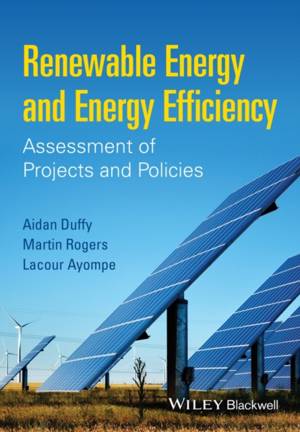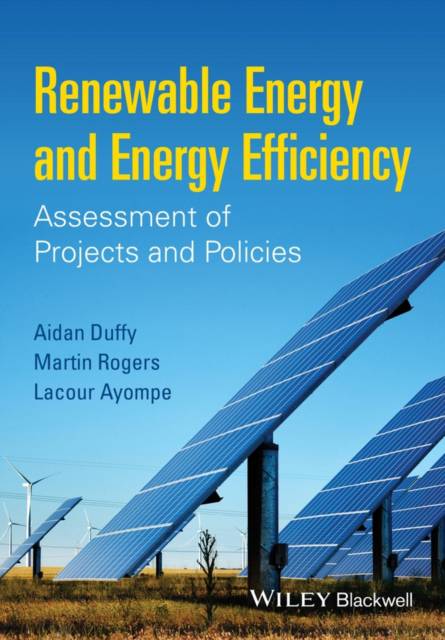
- Afhalen na 1 uur in een winkel met voorraad
- Gratis thuislevering in België vanaf € 30
- Ruim aanbod met 7 miljoen producten
- Afhalen na 1 uur in een winkel met voorraad
- Gratis thuislevering in België vanaf € 30
- Ruim aanbod met 7 miljoen producten
Zoeken
Renewable Energy and Energy Efficiency
Assessment of Projects and Policies
Aidan Duffy, Martin Rogers, Lacour Ayompe
Paperback | Engels
€ 77,45
+ 154 punten
Omschrijving
The recent rise to prominence of renewable energy and energy efficiency has been driven by their potential to lower the environmental impacts of energy use. As these technologies mature they must demonstrate not only their environmental benefits, but also their economic competitiveness. The relative costs and benefits of each potential project, whether large or small, must be systematically modelled and assessed before they can be financed and implemented.
Renewable Energy and Energy Efficiency: Assessment of Projects and Policies deals with the appraisal of such projects against financial and non-financial criteria, illustrating the assessment tools necessary to make appropriate, evidence based decisions as efficiently as possible. The most important technologies are first described, stressing their economic and performance characteristics. Key project appraisal concepts are then introduced, approaches to modelling the cash flows in energy projects are described, and the issues of uncertainty and optimisation are fully discussed. These financial concepts, together with methods for estimating greenhouse gas emissions, are extended to address aspects of energy policy. Illustrated with many case studies this is an ideal introduction to financial and non-financial appraisal techniques as applied to energy efficient and renewable energy technologies.
Renewable Energy and Energy Efficiency: Assessment of Projects and Policies deals with the appraisal of such projects against financial and non-financial criteria, illustrating the assessment tools necessary to make appropriate, evidence based decisions as efficiently as possible. The most important technologies are first described, stressing their economic and performance characteristics. Key project appraisal concepts are then introduced, approaches to modelling the cash flows in energy projects are described, and the issues of uncertainty and optimisation are fully discussed. These financial concepts, together with methods for estimating greenhouse gas emissions, are extended to address aspects of energy policy. Illustrated with many case studies this is an ideal introduction to financial and non-financial appraisal techniques as applied to energy efficient and renewable energy technologies.
Specificaties
Betrokkenen
- Auteur(s):
- Uitgeverij:
Inhoud
- Aantal bladzijden:
- 288
- Taal:
- Engels
Eigenschappen
- Productcode (EAN):
- 9781118631041
- Verschijningsdatum:
- 26/05/2015
- Uitvoering:
- Paperback
- Formaat:
- Trade paperback (VS)
- Afmetingen:
- 168 mm x 241 mm
- Gewicht:
- 521 g

Alleen bij Standaard Boekhandel
+ 154 punten op je klantenkaart van Standaard Boekhandel
Beoordelingen
We publiceren alleen reviews die voldoen aan de voorwaarden voor reviews. Bekijk onze voorwaarden voor reviews.







